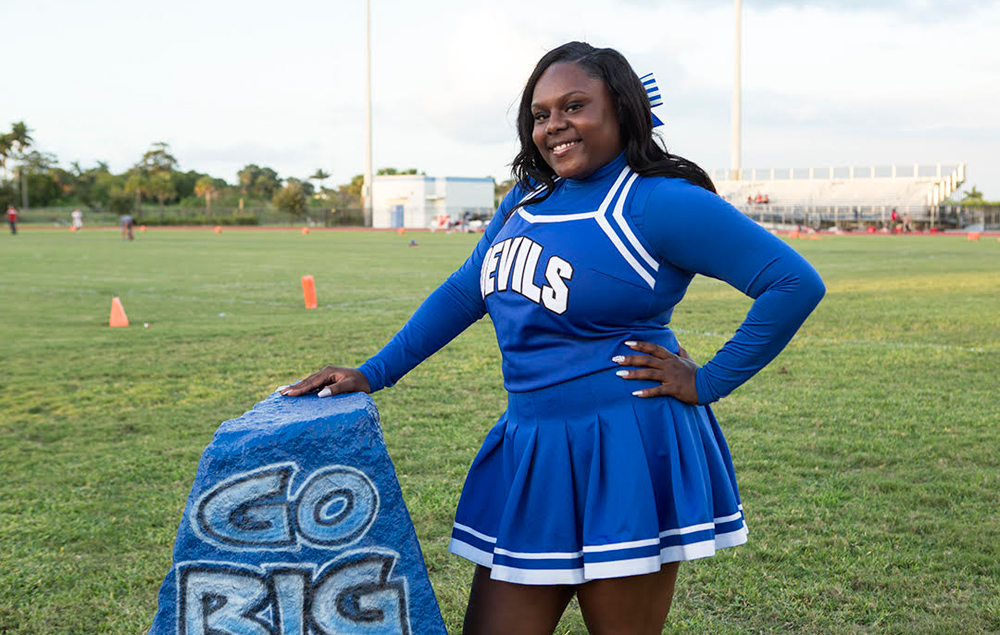A few years ago, Ivete Lucas and Patrick Bresnan quietly embarked on one of the most special film projects in recent memory when they began to roll their cameras in Pahokee, Florida not far where Bresnan’s father was living in West Palm Beach. They were taken with seeing a young woman in a prom dress making her way down the side of a dusty road, an image that ultimately led to their first short about the teenagers in the area, “The Send-Off,” and the two continued to create vignettes about growing up in the region that cut across cultures as familiar rites of passage but entirely unique as events in and of themselves. Lucas and Bresnan put on their running shoes to keep up with a young man who makes a meal of the local livestock in “The Rabbit Hunt” and headed to the beach to catch a true stolen moment with recent grads from Pahokee High in “Skip Day” who get a respite from thinking about the tough circumstances they’ve come from or the uncertain future they’re stepping into.
Traveling to festivals as far and wide as Sundance and Cannes, these little pieces of Pahokee have been able to make their mark in their world in ways that residents of the small town likely could never have imagined — and many of them have gotten to see it firsthand, often accompanying the films they appear in on the festival circuit. It was inevitable that after building such a strong foundation of trust within the community, Lucas and Bresnan would make a feature. However, “Pahokee” isn’t what one might expect upon hearing that the directing duo made a film about a group of seniors at Pahokee High because unlike most other films that have centered on the high school experience, high school isn’t central to the experience of its subjects, much as they fight for it to be.
Instead, the students Lucas and Bresnan let drift in and out of the frame, as if crossing they’ve crossed your path in the halls, have had to deal with responsibility that ideally would begin after they’re finished with school, starting out with Miss PHS hopeful Na’Kerria, who somehow fits aggressive campaigning for homecoming queen on top of her classwork and her job working well into the evenings at a fried chicken joint. She is joined on screen by Junior, a drum major who already cares for a baby girl, B.J., the most recent in a long lineage of football players coveted within the region for their professional potential, and Jocabed, who spends any time she’s away from school working at her family’s taco stand to keep a roof over all their heads.
Although graduation means a great deal to everyone in “Pahokee,” Lucas and Bresnan don’t see it as the ultimate achievement for the quartet of kids who exhibit grace and resolve on a daily basis, the products of an impoverished community that is eager to celebrate every milestone, whether it’s a school dance or an unexpected playoff run for the football team, to make the small town feel like the biggest place on earth. While the community can be seen working towards making that illusion feel as if it’s reality, the filmmakers exquisitely pick apart the invisible barriers the students face, cutting back from time to time to the sugar cane fields where much of Pahokee puts in back-breaking labor as a reminder of the life they’re born into and that this current generation attempts to transcend — never leaving the present, yet conveying the immense pressure that the past and thoughts of the future have applied to making the right moves now.
“Pahokee” is a beautiful film that captures the spirit of being a teenager while reflecting lives that are anything but carefree and following its premiere at Sundance earlier this year, Lucas and Bresnan have spent the summer sharing this refreshing slice of life with audiences, and the film is now available to watch online with proceeds being split with your favorite local arthouse. We were fortunate to catch up with the dynamic duo when they were at the L.A. Latino Film Festival to talk about completing a project they invested so much in, upending cultural stereotypes and making sure they putting as much or even more into the community as they were getting out of it as filmmakers.
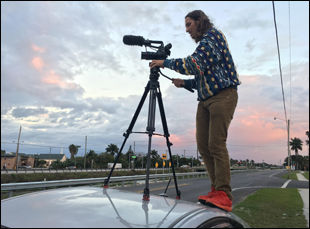
Patrick Bresnan: Originally, we had envisioned making a series of short films around rituals that coincided with the school year, but we weren’t really able to get a partner to fund the post-production, so Ivete worked really hard as an editor in Austin and we would finish the short films one at a time. They would take six months to finish, even though we had shot them all over the course of a school year.
Ivete Lucas: When we were making “The Send-Off,” the first short, we brought the kids to Sundance with us. From that time, we had that itch to show a whole year because that would explain why prom was so important and why so much effort was put into prom. They make their dresses and in a way, it’s a cultural preservation document. So we chose [this specific] year not only because it’s a pivotal year and it’s a year that decides a lot of things in people’s lives, but also because of all the rituals and celebrations and the community coming together and the little every day funny things that happen in that awkward time in teenagers’ lives. It’s a very full period in people’s lives.
Patrick Bresnan: And we didn’t want to be recording a film for four years, [but a school year has] these bookends, starting with the Miss PHS Festival and football games and it has a really natural ending [with graduation], so it pulls you in really fast. It was a period in which you could see the extraordinary efforts of the kids and the teachers and the families to help the kids leave, to help them get to the next level into a place with more economic opportunity.
Ivete Lucas: And it’s also a story within itself, where you can learn and really experience and think about the American dream and the systems that we feel allow people to do better in this meritocracy that we live in. One of my frustrations with these sort of stories is that they seem very bleak or they concentrate on the hardships, which I understand if you’re trying to denounce the hardships, but we’re really trying to provide an experience. You don’t fully understand human beings if you don’t understand the joys as well
Because you really do get to feel the experience of an entire community, how do you cover a story like this?
Patrick Bresnan: We probably followed about eight kids and we’d film a ritual focusing on one of the students and then we would give them space just to live their life and not have the camera on them all the time, so it didn’t become awkward. We were also very sensitive to the lives of the kids in that they couldn’t be distracted from getting into college by having a film made about them — their lives always took precedence over the filming, so at one point Na’Kerria was going through a really hard position in her life, and we didn’t focus on filming as much as going out to dinner with her and just making sure that she had some support system. The beautiful thing about making a film like this is we could [do that] for kids in the community that really needed a friend.
Ivete Lucas: An adult friend that is not their parent. And I think that intimacy you feel in the film is a result of our presence, both with and without the camera [because] we were very conscious this was a collaboration [with the kids] and in this collaboration, the kids needed to have agency on what they wanted to share with the world and what they didn’t. When we asked them to record stuff with their cameras, they were already doing it and it was really whatever they wanted to share. It was always their choice. We didn’t even ask them questions.
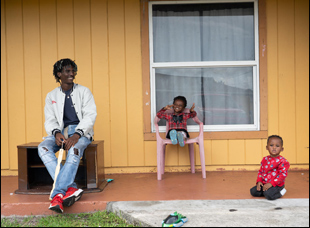
Ivete Lucas: Not always, but that year, they were not going to have a yearbook.
Patrick Bresnan: They had a budgetary crisis. When you’re going to make a film at a high school, there’s a lot of steps you have to go through with the administration and the school district and there were things we heard when we were having meetings about making the film. One that really struck me was one of the people in charge of giving us permission to make the film told me that “Our students across the district all have the same opportunities,” so it was this administrator’s opinion that a student that is in a school, say, closer to Palm Beach would have the same opportunities educationally and to get into college as someone in Pahokee or Belle Glade. So we really saw what we were documenting as a way to dispute that notion that all kids have equal access to opportunity.
Although you can certainly feel that tension in the film, that doesn’t become a major storyline in the film, whereas I imagine it would for other filmmakers. Was it much of a decision to leave that off-screen?
Patrick Bresnan: You can see it when they’re preparing for the Miss PHS event and the teacher says, “Well, we can’t afford the things you see in that book” and Na’Kerria’s paging through a book that has props for events at schools and you see the kids at the events are all white and the teacher’s saying, “Well, we have a few decorations left over from ‘A Starry Night’, so maybe that can be what we use to decorate the Miss PHS homecoming theme.”
Ivete Lucas: And they’re playing football with whatever they can get. When you see the football games, the other teams have much more resources than they do. I think in the fiction world, people find ways to dramatize things without being on the nose and I think in documentary, if we were going to record the meeting where they’re talking about [the budgetary cuts], that’s very on the nose. If we follow a storyline like Miss PHS, we will see that there’s budgetary needs and we don’t necessarily need to go to that boring school meeting and talk about it. We will see it in real life, and in my opinion, that’s a little more effective and nuanced.
When you got access to the school, it was with a different administration than the one you had during the school year. Did that complicate things?
Patrick Bresnan: Definitely. We had recorded all the short films with the permission of a previous principal, a Cuban-American immigrant [whose] dad was an immigrant who worked in the sugar cane fields, so he really understood the significance of telling these stories. When the new principal came in, he was dealing with a budgetary crisis and he also commuted from a wealthier community. He was very focused on discipline and improving the ranking of the school, and in the Glades, a lot of the schools were ranked D and F, so there was a real focus that we have to raise this ranking because that ranking can determine your funding. So he was initially opposed to the documentary being made about the school because it could be distracting to the kids and to their efforts to change the ranking of the school.
Ivete Lucas: But we had already built so many relationships in the process [of making the shorts], so one of our good friends that we were following, Big Show, went in and had a conversation with him, which I think says a lot [about] the track record that we already had of making the shorts and bringing the kids in trips with us to talk about their community and see the world. Those were factors that helped us gain access again when that administration changed.
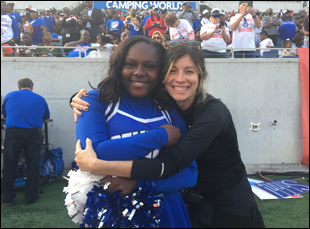
Ivete Lucas: No! [laughs] Not at all!
Patrick Bresnan: The football team was not supposed to be good. They had just lost their coach who was a former NFL player, and the first few football games of the season, no one in the town showed up. But the stands went from 40 super-enthusiastic parents to a thousand people by the Muck Bowl, so it was amazing to watch and those seniors who we see on the field, they gave everything. They had been playing football since they were three years old.
Ivete Lucas: It was a team with a lot of seniors. And we knew that they play good football there — Pahokee/Belle Glade, that area has the higher per capita football players coming out of any small town into the NFL, [which] why they had a former NFL player as their coach because he’s from there. They want to get those scholarships to go to college, but they had not been performing very well and even in the Muck Bowl scene, you can see in the trophy that they have been losing by a lot. There were some 77-0 games, so we were thinking we’ll just record as long as the football team is doing well and as verite filmmakers, we were recording every game because we didn’t know if they were going to lose.
Is it difficult to figure out how to keep the intimacy of your general style while covering a huge event like that?
Patrick Bresnan: Yeah, Ivete was recording mostly with the fans and the cheerleaders and the band, and I would be running around the field in a circle for five hours. [laughs]
Ivete Lucas: Patrick got really good at recording football.
Patrick Bresnan: We’d start at five in the afternoon [on game day] and we’d record until 11 after recording all day with the kids, doing various things around school, so the first thing we did after the game is go to the gas station and get a six-pack because our body hurt so badly.
Ivete Lucas: [laughs] It’s all handheld. And we actually did have conversations about how we were wanting to record the football games as not just a sporting event, but a community event where everybody played different roles, so we wanted to cover it from those angles [to show it] as a significant bonding experience for the community.
One of my favorite scenes in the film is actually after a game where you see N’Kerria sweeping up the floors of the restaurant she works, still in her cheerleading outfit. So you must’ve kept filming…
Patrick Bresnan: Yeah, that’s profound.There are so many stereotypes in suburban America or even Palm Beach County that people of color don’t work hard and in the films we’ve made, whether it’s “The Rabbit Hunt” or just seeing that image of Na’Kerria cheering and then leaving that celebration [at the game] and going to work a few hours after, it really dispels a lot of racist mythology. These moments are total poetry and they have the ability to change how people think and that’s why we don’t ever have our characters talking directly to us. We just need these moments to naturally happen because that’s what affects the audience.
Ivete Lucas: A lot of what we do is breaking stereotypes. That is the driving force of our filmmaking.
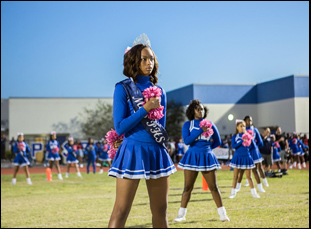
Ivete Lucas: The landscape had a lot to do with how we could communicate that this is a story of now, but it’s an ever-present story. It’s a story that has been happening forever for African-Americans and Latinos working the fields, but it’s still happening right now. I feel a lot of Americans don’t even realize that there’s still that culture of working until your body drops in the sugar cane fields in this country. In the editing, what I was trying to do was place the imagery of the workers in the sugar cane fields in places where we could meditate about that. We knew for example, the harvest is always burning and the harvest season is about nine months, so the town is always on fire in a way. We also had the idea of we know the seasons don’t necessarily change in Florida, so there’s that progression where we’re not going to show that, but we can show it with different [holidays] like Easter and Christmas within the immensity of the time of human beings on earth, but the landscape is what prevails. The landscape is what’s going to continue to be there. The sun is going to see [this generation] off and looking forward to the next to come and that cycle is going to continue for a long time, but the sun is always going to be there.
Did you feel any closure as filmmakers since this was probably the end of a specific chapter in your careers?
Ivete Lucas: In a way a film like this never ends. The editing phase was very demanding too and touring the film — we’re just coming back from Mexico where the U.S. embassy brought Jocabed to Mexico to have a screening with her parents and grandparents in Mexico City — which is so profound too.
Patrick Bresnan: Finishing “Pahokee” and having it get out to the world is an amazing thing and moving onto our next project, we want to do something very different. But Pahokee will still continue because we continue to make films in Florida and we have a Knight Foundation grant to do an artists’ residency of sorts at Pahokee High School after school teaching media literacy.
Ivete Lucas: Yeah, teaching kids to use cameras, [for example]. So it’s still continuing in that way, but we’re not filming any more movies there. And there is that closure, but our relationship will live on. Since the beginning, we knew that coming into this community and making films, it wasn’t just coming in and making films. If we introduced the camera [into the community], then we need to make sure that everything we brought is positive and an opportunity for them to take it over and make it their own, so that part of it is ongoing.
Patrick Bresnan: One thing we’re excited about came from a very local place. My family lives in West Palm Beach in Florida and Florida’s extremely segregated because of gated communities. News stories typically lead with crime, [with] people of color in those awful slots, so what we’re able to do locally now in Florida is take the story of Pahokee and show it in West Palm Beach and these areas in coastal Florida where people don’t get to interact with folks that are different with them. We just showed all of our short films at the Norton Museum in Palm Beach, so we’re really trying to engage people from communities with more resources with stories from Pahokee so they can find ways to get involved. That’s been a really rewarding part is sharing this knowledge we have and encouraging people to learn about their neighbors.
And we shouldn’t be the spokespeople for Pahokee. The dream of the film was to present it and have the audience interact and talk directly to the people in it. It’s so amazing when Jocabed is at a screening and she can say I’m in an honors program at the University of Florida. BJ’s been very busy with his football career, but he’s started a nonprofit and he’s a captain at FAMU, [where] he’s the starting center [on the football team]. Junior was at SXSW and people loved him.
Ivete Lucas: And they all were at Sundance.
Patrick Bresnan: They’ve become ambassadors for their community and they’ve realized, especially Junior and Na’Kerria, that people do care about them.
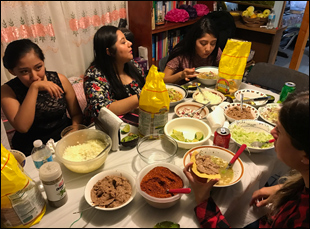
Patrick Bresnan: And the U.S. Embassy screening in Mexico City with Jocabed’s family was profound because they came to the Miami Film Festival, and there weren’t Spanish subtitles, so [Jocabed’s father didn’t fully understand it] and to see the film and really understand it with Spanish subtitles and have a Mexican audience in your home city where you emigrated from, see your life and be so proud of you that you made it — you went to the U.S., you raised beautiful daughters and you have a successful business, it tells the story we need to be telling about immigration in the U.S.
Ivete Lucas: We’re at the L.A. Latino Film Festival [now], right? And just coming back from Mexico, we’ve been through a couple traumatic years for the Latino community in the way that people have been speaking about us in the public arena, so when we show the film in Mexico, at the end, they were always so grateful to see a positive representation of what the immigrant experience could be and also of the richness of culture that they’re bringing to the U.S. Over the years, films mean different things, but right now it’s a very healing thing to watch, and in a way, “Pahokee” came from a place of admiration and love. It was a beautiful project to do and probably the next project is not going to be from that same place, it’s probably going to be something different, but it’s really nice to have something so profound and positive that we made together.
“Pahokee” is available to watch online here through Monument Releasing’s Virtual Cinema, with some of the proceeds going to support your local arthouse.




